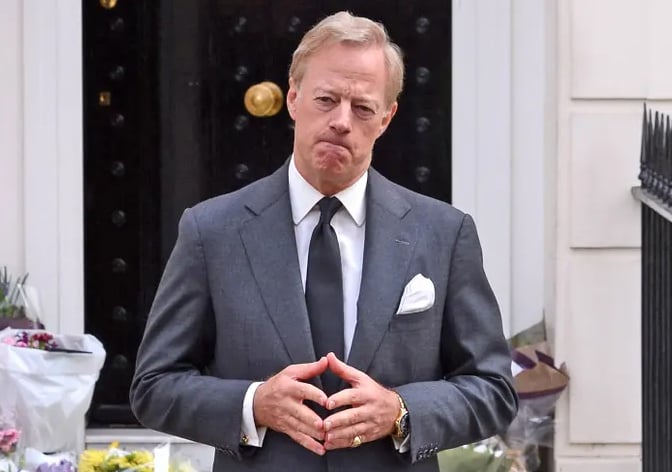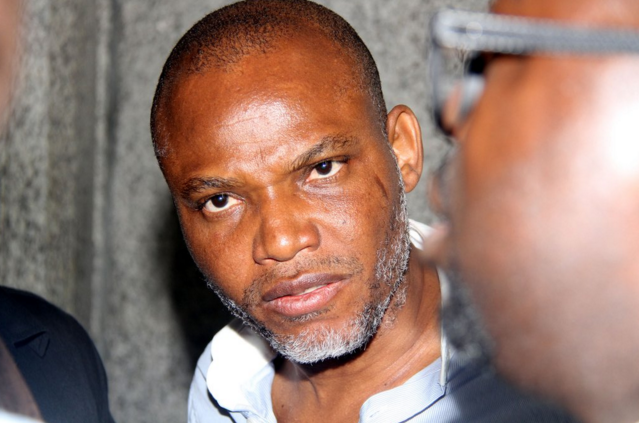Nnamdi Kanu
It has been one week since the re-arrest of Nnamdi Kanu, leader of the Indigenous People of Biafra (IPOB), who is being prosecuted for alleged terrorism and treasonable felony.
A lot has happened since then: the UK started engaging Nigeria over the arrest of Kanu, who is also a British national; IPOB said its secessionist quest for Biafra continues; while the federal government claimed Kanu orchestrated the killing of 60 people in the country while he was abroad.
There have also been talks about the possibility of the separatist leader losing his British citizenship, with IPOB declared a terrorist organisation in Nigeria.
But can that happen?
Advertisement
WHEN CAN BRITISH CITIZENSHIP BE TAKEN AWAY?
The British nationality act empowers the UK to strip its nationals of their citizenship under certain circumstances.
Section 40(2) provides that the UK secretary of state can “deprive a person of a citizenship status if the Secretary of State is satisfied that deprivation is conducive to the public good”.
Advertisement
What then constitutes public good? A UK government document explains conduciveness to the public good to mean “depriving in the public interest on the grounds of involvement in terrorism, espionage, serious organised crime, war crimes or unacceptable behaviours”.
If such a person became a UK citizen by naturalisation, the conditions for stripping them of their nationality expand further to include: “If the Secretary of State is satisfied that the registration or naturalisation was obtained by means of—(a) fraud, (b) false representation, or (c) concealment of a material fact.”
NATURE OF KANU’S CITIZENSHIP MAKES HIS CASE WORSE
The nationality act law allows for consideration where someone could become stateless — that is, without a nationality — if their citizenship is revoked.
Advertisement
In cases where the “public good” is involved, it states that the UK secretary of state “may not make an order” revoking the citizenship “if he is satisfied that the order would make a person stateless”.

But there are exceptions provided, including if the person is not born in the UK.
Subsection 4(A) states such order can still be made if: “(a)the citizenship status results from the person’s naturalisation, (b)the Secretary of State is satisfied that the deprivation is conducive to the public good because the person, while having that citizenship status, has conducted him or herself in a manner which is seriously prejudicial to the vital interests of the United Kingdom, any of the Islands, or any British overseas territory, and…
“(c)the Secretary of State has reasonable grounds for believing that the person is able, under the law of a country or territory outside the United Kingdom, to become a national of such a country or territory.”
Advertisement
TheCable could not immediately verify the type of UK citizenship the IPOB leader has, but it is most likely that he became a national of the country by naturalisation.
The BBC reported that the IPOB leader, who claims he is a Jew, moved to the UK before he could complete his undergraduate studies at the University of Nigeria Nsukka (UNN).
Advertisement
That would mean that he is covered under the conditions for citizenship by naturalisation and dual nationality as provided under subsection 4(A).
WHO’S HAD THEIR UK CITIZENSHIP REVOKED IN THE PAST?
Advertisement
The British newspaper Independent reported in 2019 that at least 150 people have been stripped of their UK citizenship after being subjected to the measure for the “public good” since 2010.
It gets more interesting: nearly 70 percent of those revocations were in 2017, a sudden spike from what used to be a few deprivations.
Advertisement
A lot more persons have also been stripped of their British nationality and banned from returning to the UK, according to the UK Guardian, most of them suspected terrorists.
A particularly notable case was that of Shamima Begum, who left the UK in 2015 to join the Islamic State group in Syria as a 15-year-old.
In February 2021, the supreme court upheld the decision of Sajid Javid, then home secretary, to revoke Begum’s citizenship later in 2019.

Her citizen deprivation was thought to have been considered because of her dual nationality — she was born in the UK to parents of Bangladeshi heritage.
There is room for appeal for those who lost their citizenship. But Begum did so and lost.
In February this year, the supreme court upheld Javid’s decision and said, among other things, that: “There was no evidence before the Court as to whether the national security concerns about Ms Begum could be addressed and managed by her being arrested and charged upon her arrival in the UK, or by her being made the subject of a Terrorist Prevention and Investigation Measure.”
TERRORISM TOPS THE LIST OF REASONS
Available data show that, like Begum, most of the others whose British citizenship has been revoked have also been linked to terror-related activities.
IPOB, which Kanu set up in 2014, is only recognised as a terrorist organisation in Nigeria, where it was proscribed by the defence headquarters and the court in 2017.
The Buhari administration has been heavily criticised for the action while the UK has not said anything publicly about it. However, the British government is known to not take terror-related activities lightly when considering “public good”.
Most of those who have lost their British citizenship was as a result of links to terrorism, although some were not charged to court before the action was taken. El Shafee Elsheikh and Alexanda Kotey, who were both accused of belonging to an ISIS group involved in kidnappings in Iraq and Syria; Mohamed Sakr, who was suspected of being involved with al-Shabaab; and Hilal al Jedda, who was alleged to have recruited terrorists in Iraq are a few of those whose UK citizenship was taken away.
There have also been other cases not related to terrorism, including twelve of the 20 citizen revocations carried out in 2013 on grounds of fraud.
This does not mean that the UK is always fast to revoke citizenship where a serious crime is involved.
In 2005, Mark Thatcher, son of former Prime Minister Margaret Thatcher was convicted in South Africa for funding the 2004 Equatorial Guinea coup attempt, but he remains a UK citizen.
Will Kanu end up like Thatcher or Begum?
1 comments








No.. I pray he doesn’t